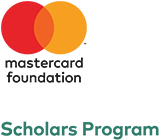Ending education inequity

All children deserve quality education, says Mastercard Foundation scholar, Emilllie Albert. As co-founder of Teach the Nation, she’s working to end education inequity and develop future leaders.
South African children in Grade 5 ranked second to last on the international TIMSS mathematics assessment test. When it comes to literacy, only one-third of local children aged 9-years-old can read.
These troubling statistics reveal gaps in South Africa's education system that can have far reaching effects. Indeed, only half of school children will make it to matric and less than half of those learners will pass.
“South Africa is failing too many of its young people when it comes to education,” says the 2020 State of Education in South Africa report from Amnesty International. “The system continues to be dogged by stark inequalities and chronic underperformance that have deep roots in the legacy of apartheid.”
But that doesn’t have to be the case, says Emillie Albert. The 2019 Mastercard Foundation scholar has made it her mission to change these statistics and bring all children access to quality education in South Africa.
“My vision to change the narrative of education inequity, and through that to impact the narrative of poverty and its social impact,” Albert says. “Education can make it possible for every child to achieve their highest potential irrespective of their socioeconomic background.”
Albert is working toward this as the co-founder of Teach the Nation, the South African chapter of the global Teach for All non-profit organisation. Launched in 2019, it provides two-year fellowships to young graduate professionals who work as educators and leaders in rural communities.
“Our fellows help uplift these children while developing their leadership skills,” Albert explains. “And as they develop, the community develops alongside them.”
Community development is a vital part of the Teach the Nation fellowship, in line with Albert’s commitment to education around climate change.
“I’ve always felt that through education and leadership, children and learners become global citizens, and the culture and values associated with that can empower them in climate change action,” she says.
Hailing from the Rodrigues Island in Mauritius, she worked with vulnerable fishing communities before enrolling in her Master’s in Climate Change and Development at the University of Cape Town (UCT) as a Mastercard Foundation scholar.
“Being a Mastercard scholar has really helped to develop me as a leader and assisted with access to networks that prepared me to take on this project,” she says.
The mentorship aspect of the programme, where each scholar is paired with a senior UCT student who is trained to guide and support them, was the most impactful.
“My mentor was not only a valuable contributor to my studies, but also from a career development perspective. He gave me the support I needed to see myself as a co-founder and a leader myself,” Albert says.
Her leadership has helped Teach the Nation achieve the milestone of recruiting its 100th fellow in 2020. The initiative has also joined Spanish partners to train 1,500 teachers in South Africa. The next step is to grow as a national organisation and to improve learner outcomes and impact communities across the country.
“It’s been a challenging three years, but it’s very exciting to now see it all coming together and to watch our vision come to life,” she says.
Image courtesy of Teach the Nation.
